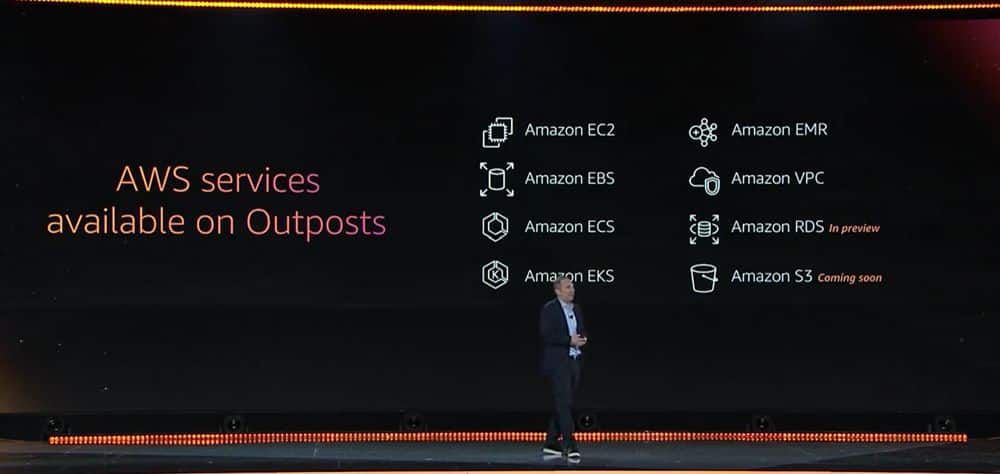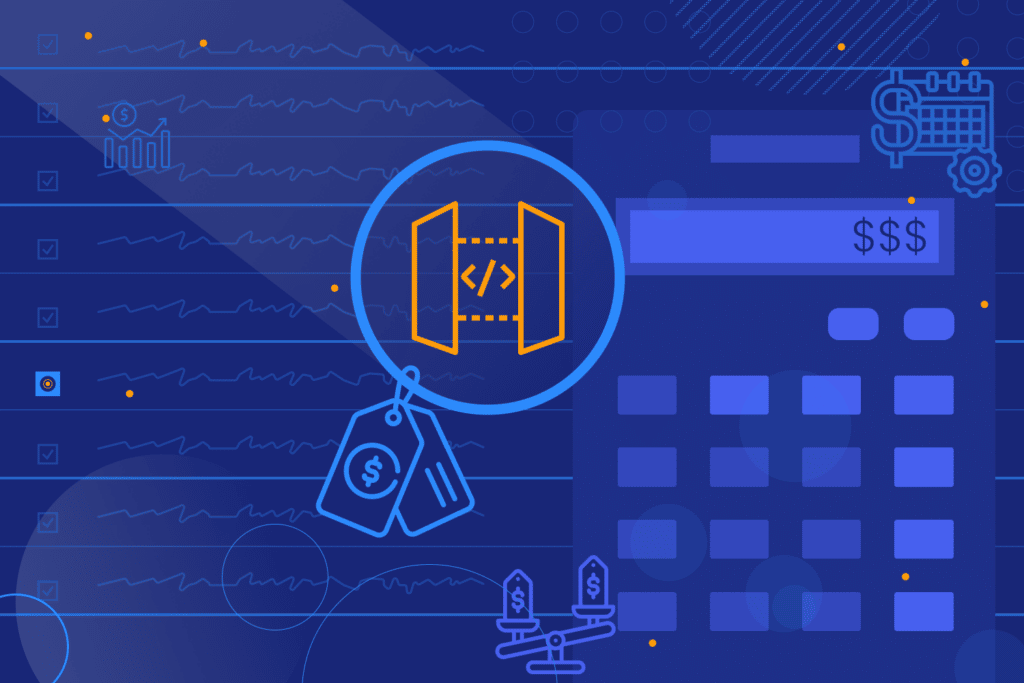Karl Robinson
December 3, 2019
Karl is CEO and Co-Founder of Logicata – he’s an AWS Community Builder in the Cloud Operations category, and AWS Certified to Solutions Architect Professional level. Knowledgeable, informal, and approachable, Karl has founded, grown, and sold internet and cloud-hosting companies.
Today, AWS CEO Andy Jassy launched the annual AWS re:Invent conference with his 3 hour long keynote addressing the 65,000 attendees. With the CEO of Goldman Sachs DJing before the event, and the re:Invent band introducing Andy’s announcements there was plenty of razzmatazz. Don’t have time to watch the 3 hour replay? Here are the key product launch announcements.

1. New Graviton EC2 instance Types
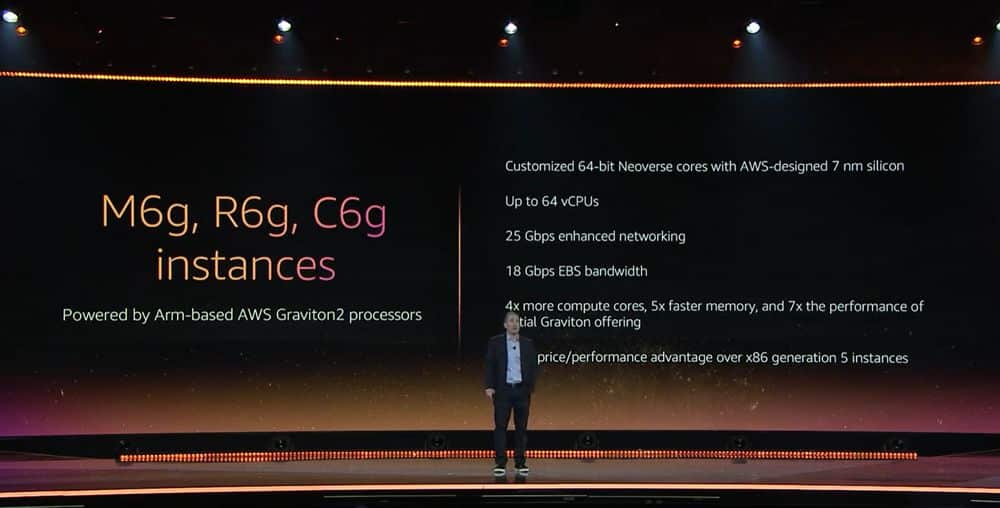
Andy announced the launch of new M6g, R6g and C6g instance types powered by the AWS Graviton2 processors, a product of the AWS acquisition of Anapurna labs. The new instance types offer:
- Customized 64 bit Neoverse cores with AWS-designed 7nm silicon
- Up to 64 vCPUs
- 25Gbps enhanced networking
- 18Gbps EBS bandwidth
- 4 x more compute cores, 5 x faster memory and 7 x the performance of the initial Graviton offering
- 40% price performance advantage over x86 generation 5 instances.
These new instance types are designed to be used for scale out, containerized microservices workloads. They delivers up to 45% cost savings for scale out workloads.
2. New Inf1 EC2 Instances
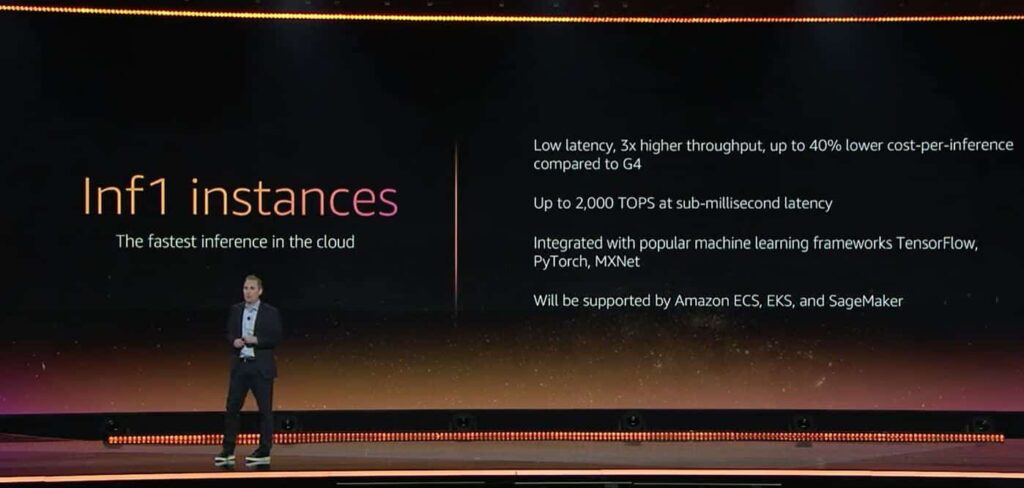
Next up were the Inf1 EC2 instance types which are optimized for Machine Learning.
- Low latency, 3 x higher throughput, up to 40% lower cost-per-inference compared to G4
- Up to 2000 TOPS at sub-millisecond latency
- Integrated with popular machine learning frameworks TensorFlow, PyTorch, MXNet
- Will be supported by Amazon ECS, EKS and Sagemaker
3. Amazon Fargate for Amazon ECS
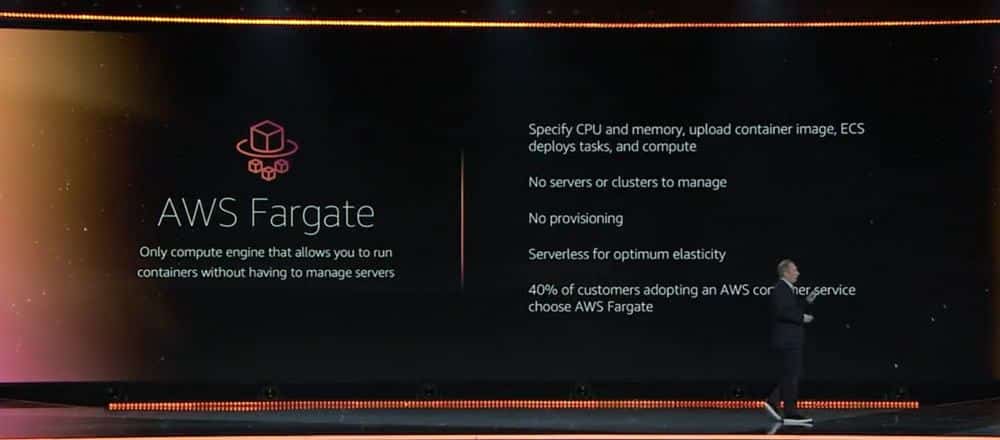
Andy then went on to announce AWS Fargate for ECS. AWS Fargate is the only compute engine that allows you to run containers without having to manage servers. It allows you to:
- Specify CPU and memory, upload container images, ECS deploys tasks and compute.
- No servers or clusters to manage
- No provisioning
- Serverless for optimum elasticity
- 40% of customers adopting an AWS container service choose AWS Fargate
4. Amazon S3 Access Points
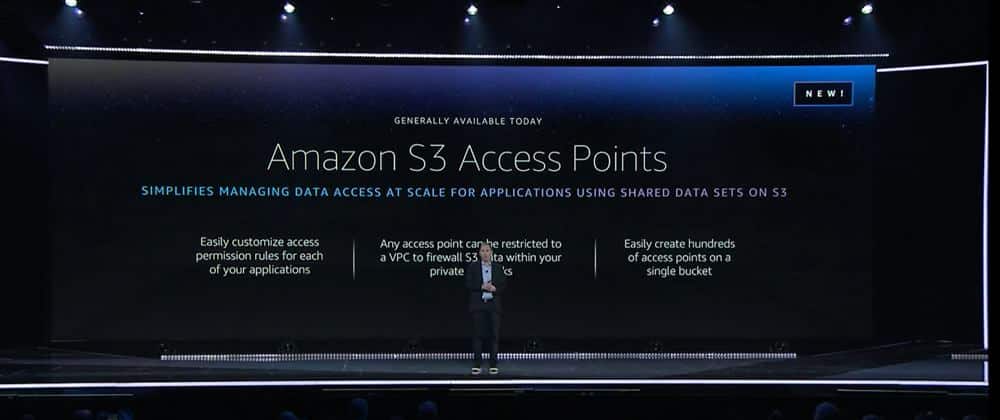
Amazon S3 Access Points helps you to assign different access policies to different applications accessing your S3 datalakes.
- Easily Customize access permission rules for each of your applications
- Any access point can be restricted to a VPC to firewall S3 data within your private networks
- Easily create hundreds of access points on a single bucket.
5. Redshift RA3 Instances with Managed Storage
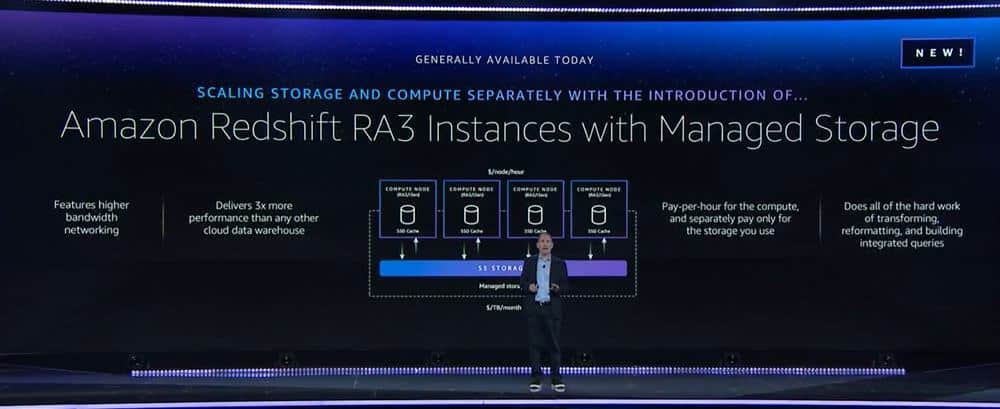
Redshift RA3 Instances with Managed Storage enable Amazon Redshift users to separate Storage from Compute, to enable separate scaling.
- Higher Bandwidth Networking
- 3 x more performance than any other cloud data warehouse
- Pay per hour for the compute, and separately pay for only the storage you use.
- Does all of the hard work of transforming, reformatting and building integrated queries
6. AQUA for Redshift
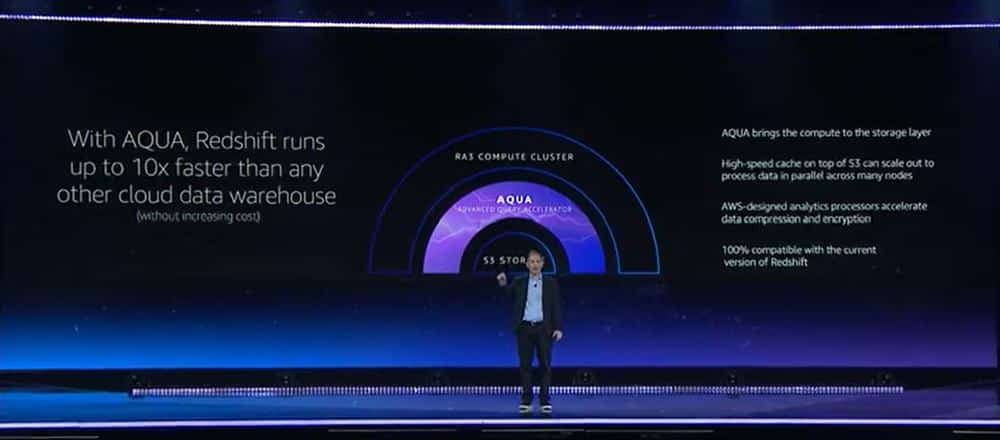
With AQUA, Redshift can operate up to 10x faster than any other data warehouse.
- AQUA brings the compute to the storage layer
- High Speed Cache on top of S3 can scale out to process data in parallel across many nodes
- AWS-designed analytics processors accelerate data compression and encryption
- 100% compatible with current version of Redshift
7. Ultrawarm Storage for Elasticsearch
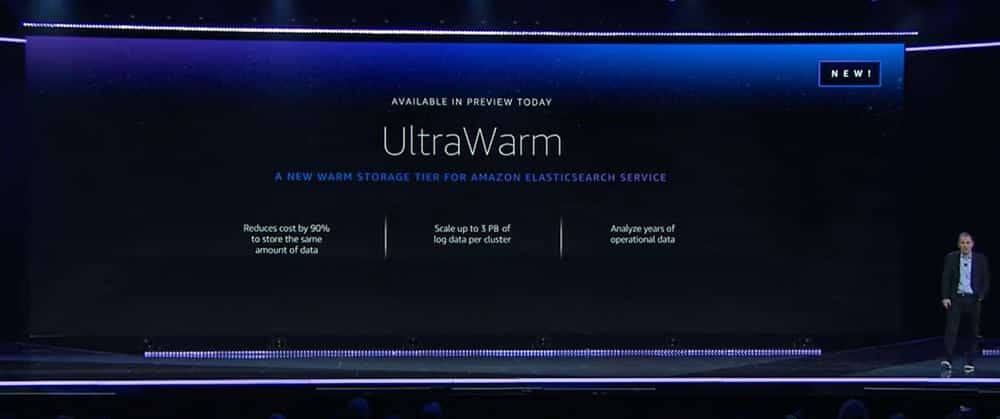
Ultrawarm storage for Elasticsearch is ‘warm storage on steroids’!
- Reduces costs by 90% to store the same amount of data
- Scale up to 3PB of log data per cluster
- Analyze years of operational data
8. Amazon Managed Cassandra Service (Preview)
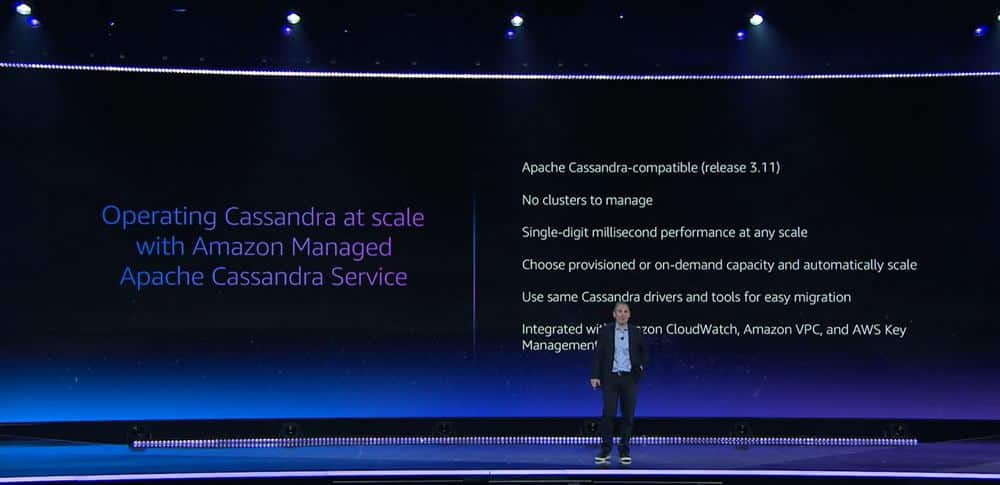
Amazon Managed Cassandra Service enables customers to operate Cassandra at scale.
- Apache Cassandra-compatible (release 3.11)
- No clusters to manage
- Single digit millisecond performance at any scale
- Choose Provisioned or on demand capacity and automatically scale
- Use same Cassandra drivers and tools for easy migration
- Integrated with Amazon Cloudwatch, Amazon VPC and AWS Key Management
9. Sagemaker Studio
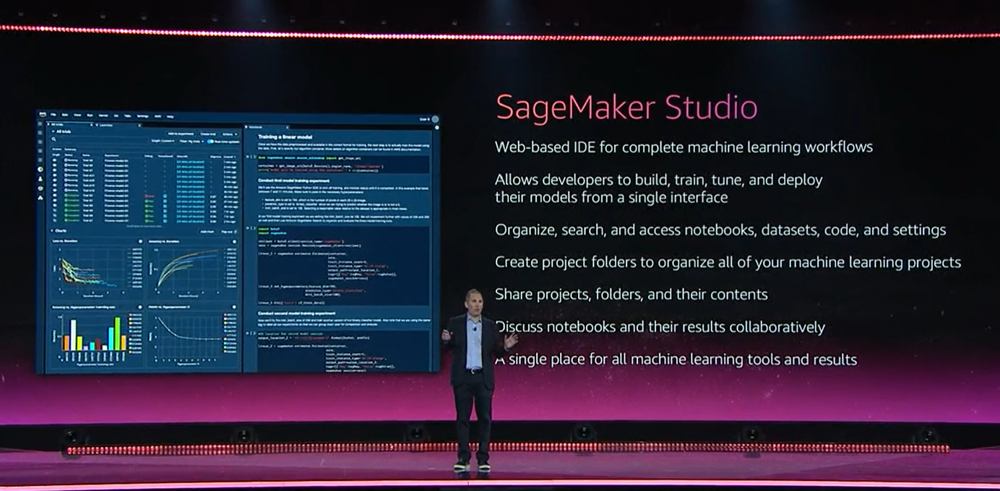
SageMaker Studio is the First integrated development environment for machine learning.
- Web based IDE for complete machine learning workflows
- Allows developers to build, train, tune and deploy their models from a single interface
- Organize, search and access notebook, datasets, code and settings
- Create project folders to organize all of your machine learning projects
- Share projects, folders and their contents
- Discuss notebooks and their results collaboratively
- A single place for all machine learning tools & results
10. SageMaker Notebooks
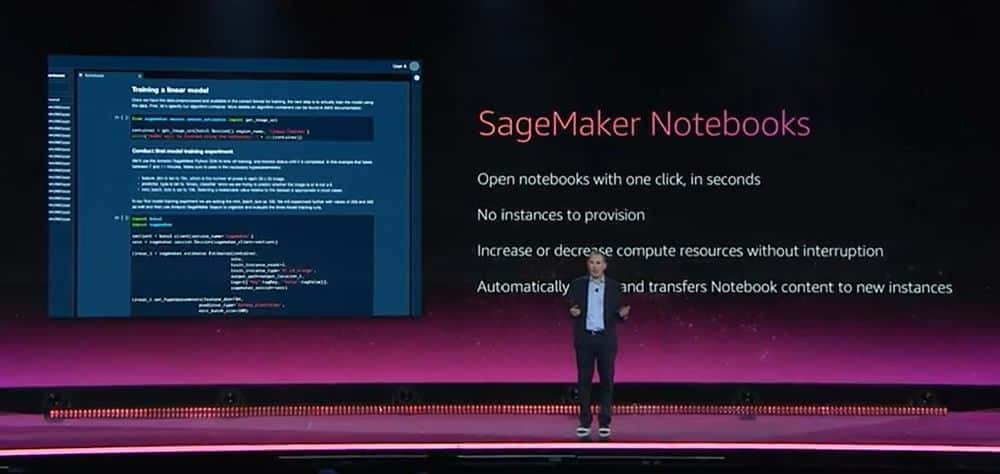
- Open notebooks with one click, in seconds
- No instances to provision
- Increase or decrease compute resources without interruption
- Automatically copies and transfers Notebook content to new instances
11. SageMaker Experiments
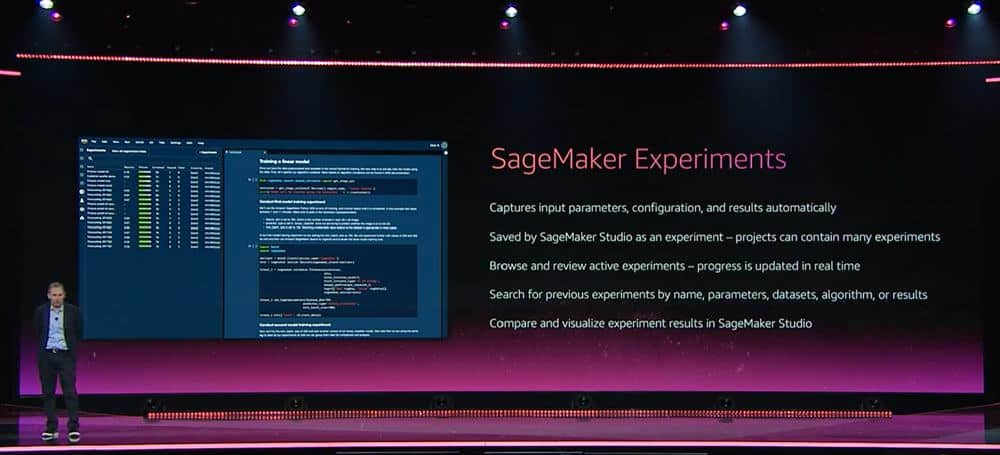
- Captures input parameters, configuration and results automatically
- Saved by SageMaker Studio as an experiment – projects can contain many experiments
- Browse and review active experiments – progress is updated in real time
- Search for previous experiments by name, parameters, datasets, algorithm, or results
- Compare and visualize experiment results in SageMaker Studio
12. SageMaker Debugger
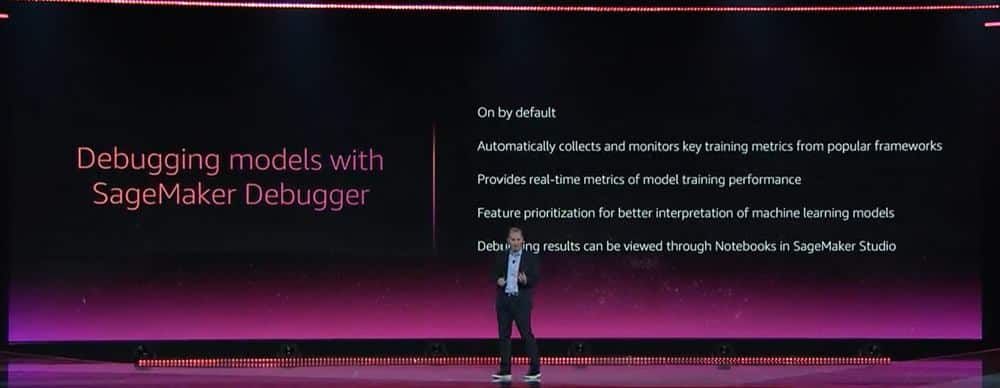
- On by default
- Automatically collects and monitors key training metrics from popular machine learning frameworks
- Provides real-time metrics of model training performance
- Feature Prioritization for better interpretation of machine learning models
- Debugging results can be viewed through Notebooks in SageMaker Studio
13. SageMaker Model Monitor
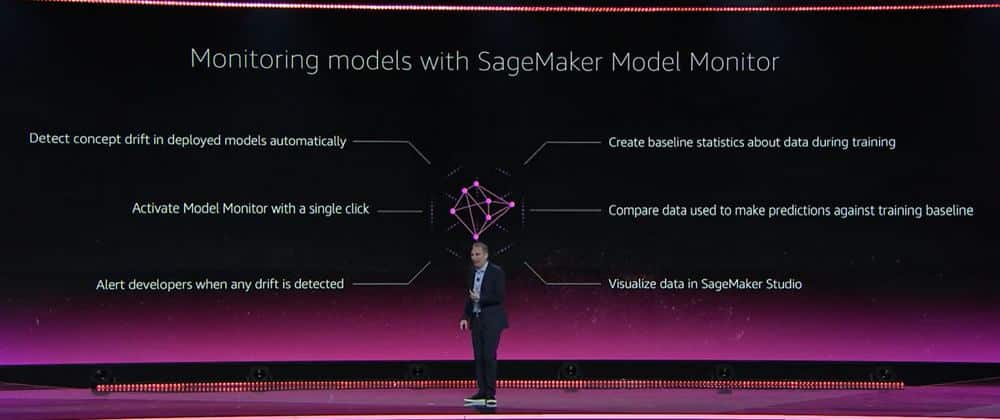
SageMaker Model Monitor can be activated with a single click, and enables ML practitioners to:
- Detect concept drift in deployed models automatically
- Alert developers when any drift is detected
- Create baseline statistics about data during training
- Compare data used to make predictions against a baseline
- Visualize data in SageMaker Studio
14. SageMaker Autopilot
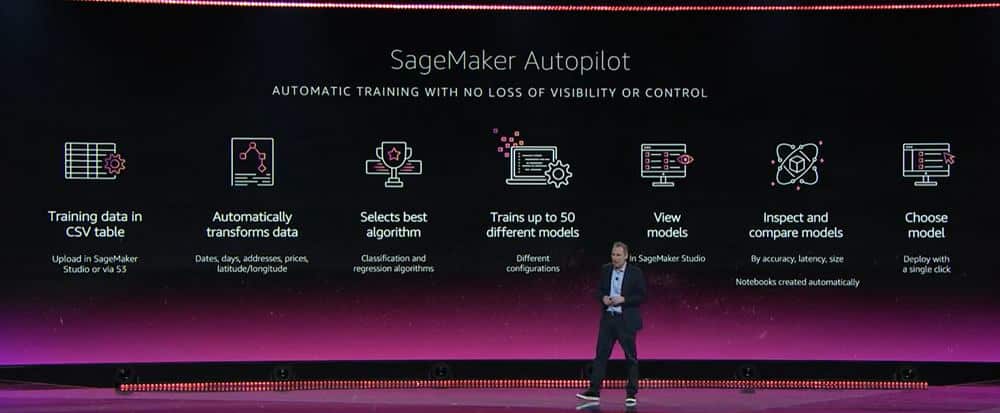
SageMaker Autopilot enables automatic machine learning model training with no loss of visibility or control.
- Training data in CSV table, upload in SageMaker Studio or via S3
- Automatically transforms data – dates, days, addresses, prices, latitude/longitude
- Selects best algorithm – classification and regression algorithms
- Trains up to 50 different models
- View models in SageMaker Studio
- Inspect and compare models by accuracy, latency, size – notebooks created automatically
- Choose model and deploy with a single click
15. Amazon Fraud Detector
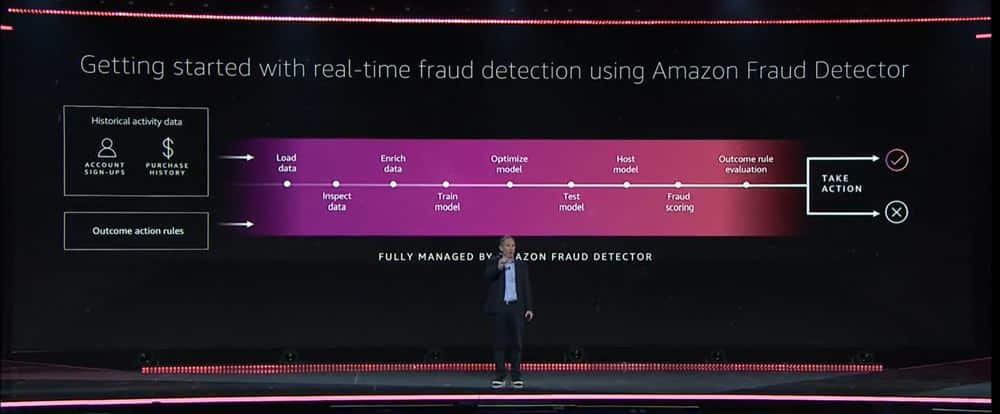
Amazon Fraud Detector is a new machine learning service that helps with fraud management in real time.
16. Amazon Code Guru
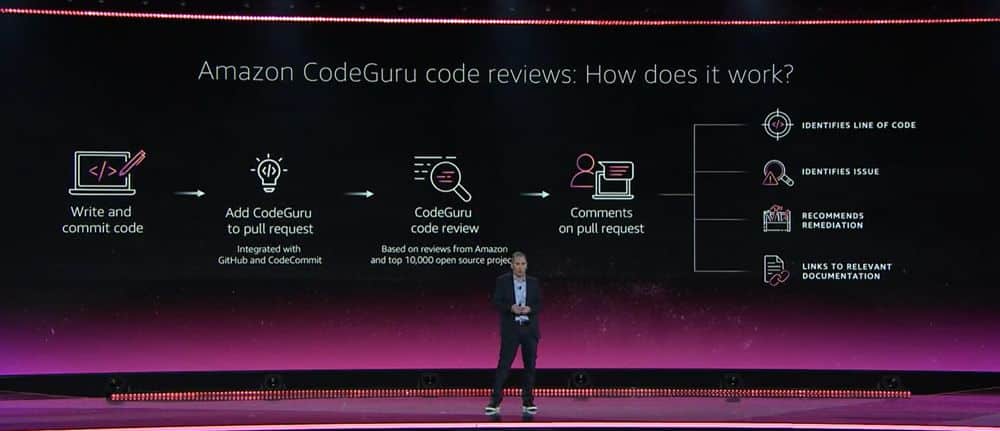
Amazon Code Guru is a new machine learning service to automate code reviews and identify the most expensive lines of code.
- Reviews AWS best practices
- Concurrency issues
- Incorrect handling
- Identify correct input validation
How does it work?
- Configure and install agent
- Code guru profiling
- Creates code profile every 5 mins
- Identifies latency and CPU utilization
- Identifies most expensive line of code
17. Contact Lens for Amazon Connect
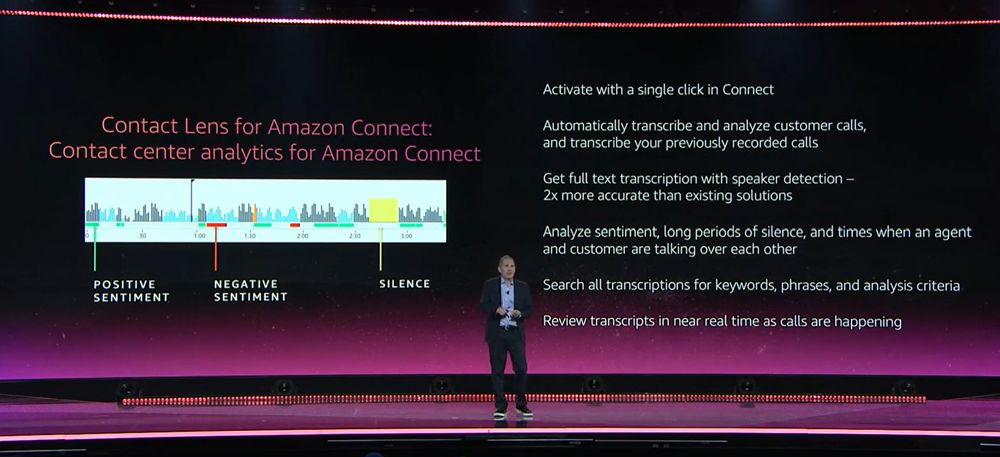
Contact Lens for Amazon Connect is a new machine learning powered sentiment analysis tool for Amazon Connect contact centers. It can be activated with a single click in Amazon Connect.
The service can:
- Automatically transcribe and analyze customer calls, and transcribe previously recorded calls
- Get full text transcription with speaker detection – 2 x more accurate than existing solutions
- Analyze sentiment, long periods of silence, and times when customer and agent are talking over one another
- Search all transcriptions for keywords, phrases, and analysis criteria
- Review transcripts in near real time as calls are happening.
18. Amazon Kendra
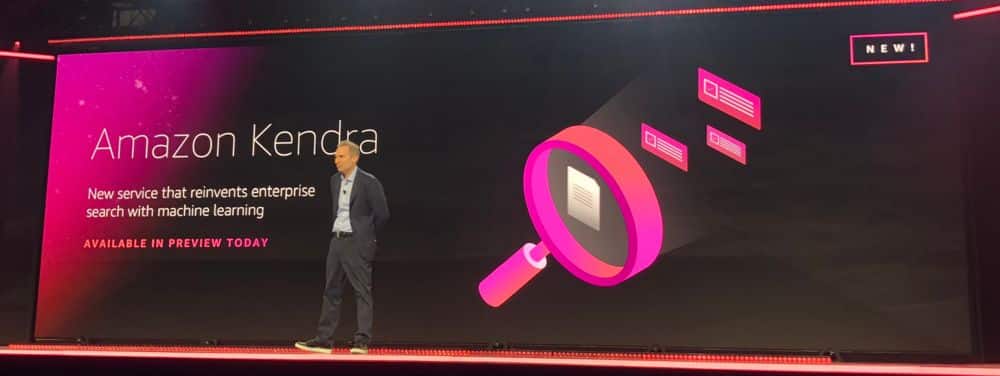
Amazon Kendra Reinvents enterprise search with machine learning and natural language processing
Kendra can be set up through AWS console. All you need to do is:
- Configure data sources
- Add FAQs
- Sync and Index data
Kendra can answer natural language queries by searching through all documents and data applying natural language processing.
19. AWS Outposts (General Availability)
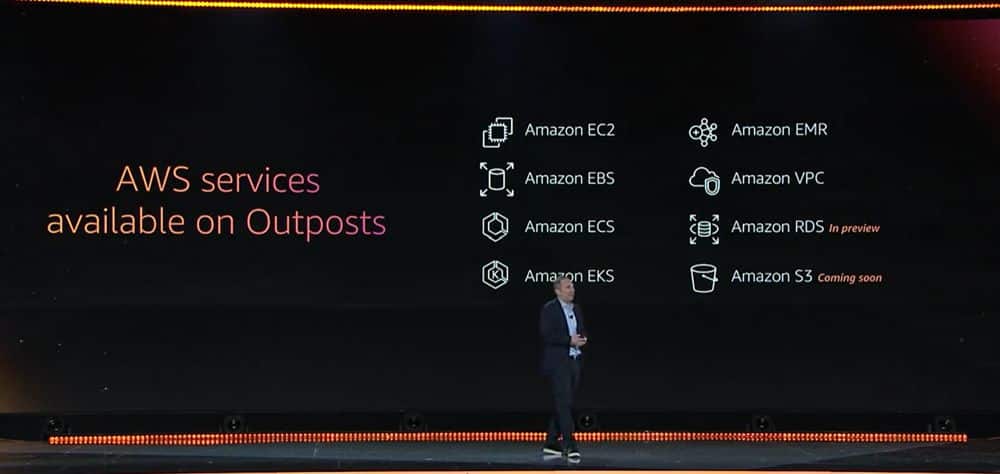
AWS Outposts were announced last year at re:Invent and are now going general availability. AWS Outposts enable customers to run AWS in their on premises datacenters. Outposts are available in 2 variants:
- AWS Native – AWS control plane – available today
- VMware Cloud on AWS Outpost – VMware control plane (available early 2020)
The following AWS services can currently run on AWS Outposts:
- Amazon EC2
- Amazon EBS
- Amazon ECS
- Amazon EKS
- Amazon EMR
- Amazon VPC
- Amazon RDS (preview)
- Amazon S3 (coming soon)
20. AWS Local Zones
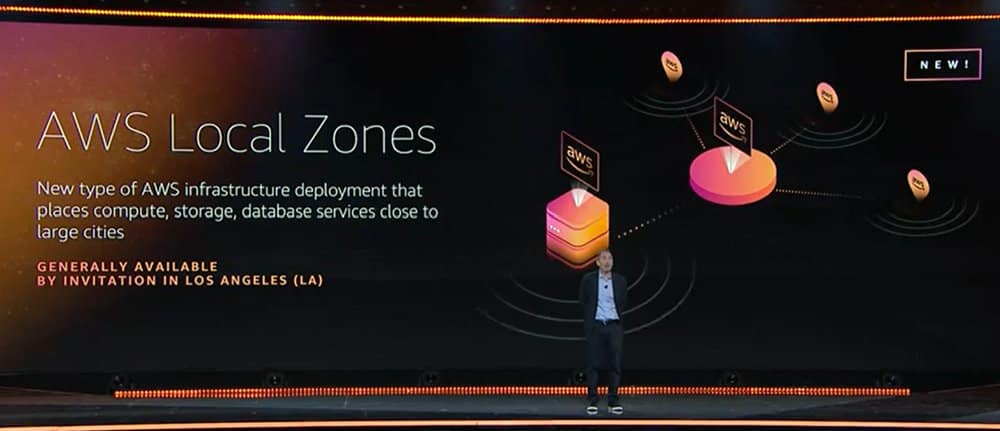
AWS Local Zones are a new type of AWS infrastructure deployment that places compute, storage, database services close to large cities. AWS Local Zones is Generally Available available today in Los Angeles.
AWS Local Zones enable single digit millisecond latencies for end customers near a local zone.
21. AWS Wavelength
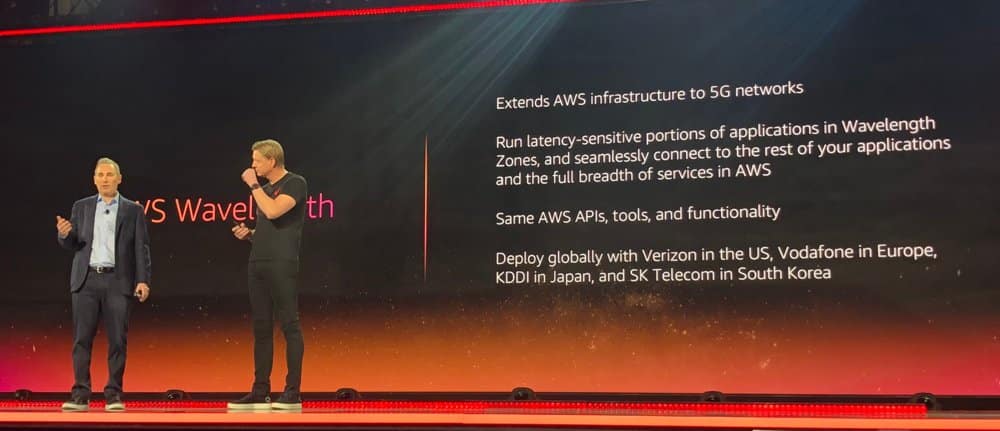
AWS Wavelength is coming in 2020 – it will deliver AWS storage and compute at the edge for 5G networks.
This will enable customers to run latency sensitive portions of applications in Wavelength zones, and seamlessly connect to the rest of their applications and the full breadth of services in AWS.
The service will be deployed globally with Verizon, Vodafone, KDDI and SK Telecom.
And that’s a wrap…
So there you have it. 21 new services announced over 2 hours 50 minutes of AWS re:Invent keynote in fabulous Las Vegas. Let’s see what tomorrow has in store!

